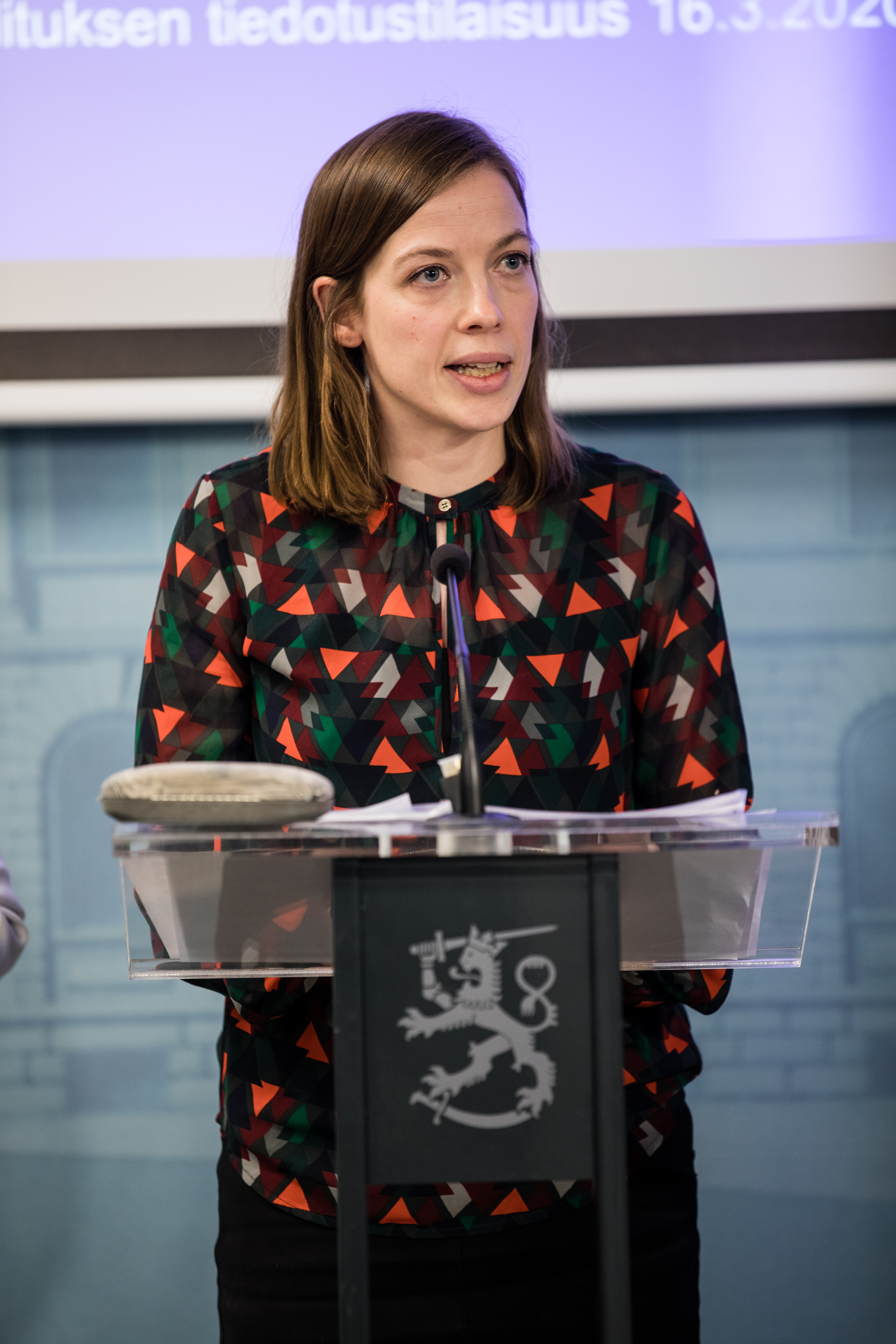1. Overview
Li Sigrid Andersson (Li Sigrid AnderssonLi Sigrid AnderssonSwedish) is an influential Finnish politician and a prominent figure in the Left Alliance, recognized for her strong advocacy for social justice and human rights. Born on May 13, 1987, in Turku, she is a Swedish-speaking Finn who has carved out a significant career at both national and European levels. She served as Minister of Education from 2019 to 2023 and led the Left Alliance as its chairperson from 2016 until 2024. A former Member of Parliament for the Varsinais-Suomi constituency from 2015 to 2024, Andersson has also been a long-serving city councillor in Turku. In 2024, she achieved a historic milestone by receiving the highest number of votes ever recorded in a European Parliament election in Finland, securing a seat as a Member of European Parliament (MEP) and subsequently being elected as the chair of the Committee on Employment and Social Affairs (EMPL). Her political views emphasize a progressive social agenda and a nuanced foreign policy that prioritizes Nordic cooperation and non-proliferation of nuclear weapons within NATO.
2. Early Life and Background
Li Andersson's early life and educational pursuits laid the groundwork for her distinguished career in Finnish politics, marked by her strong academic foundation and connection to her linguistic identity.
2.1. Birth, Family, and Identity
Li Sigrid Andersson was born on May 13, 1987, in Turku, Finland. She identifies as a Swedish-speaking Finn, a national minority in Finland. In her personal life, Andersson cohabits with former ice-hockey player Juha Pursiainen in Turku, and they welcomed their first child, a daughter, in January 2021.
2.2. Education
Andersson pursued her higher education at Åbo Akademi University, from which she graduated in 2010. She earned a Bachelor of Social Science with a specialization in international law, focusing particularly on international human rights law and refugee law. Her academic minor was in Russian language and culture, which provided her with a broader understanding of international relations and cultural dynamics, influences that would later inform her political career and advocacy.
3. Political Career
Li Andersson's political career demonstrates a steady rise through various levels of Finnish governance, from local municipal roles to national ministerial positions and, most recently, a significant role within the EU Parliament.

3.1. Early Political Engagement
Andersson began her political engagement early, serving as the chair of the Left Youth, the youth wing of the Left Alliance party. Her initial foray into electoral politics included candidacies in municipal elections for Turku. While she was not elected in 2008, receiving 175 votes, she successfully secured a seat in 2012 with 2,422 votes. Her increasing popularity was evident in the 2017 municipal elections, where she garnered 6,415 votes, securing the highest number of votes of any candidate outside of Helsinki and ranking sixth nationally.
In the parliamentary elections of 2015, Andersson achieved a significant breakthrough, being elected to the Parliament of Finland from the Varsinais-Suomi constituency. She secured the highest number of personal votes in the district, which was notably allocated 17 seats and included the chairpersons of both the National Coalition Party and the Green League as opposing candidates.
3.2. Left Alliance Leadership
In February 2016, Li Andersson officially announced her candidacy for the leadership of the Left Alliance. Following an unofficial poll among party members on June 6, 2016, she emerged as the clear frontrunner, receiving 3,913 votes, which constituted 61.85% of the total. This strong showing led to the withdrawal of all other candidates, leaving her as the sole contender for the position. Her leadership was formally confirmed on June 11, 2016, at the Left Alliance party meeting held in Oulu.
3.3. Minister of Education
After the 2019 parliamentary election, in which the Left Alliance increased its representation by four seats, bringing its total to 16 out of 200, the party joined the Social Democratic Party-led Rinne Cabinet. As a result, Li Andersson was appointed as the Minister of Education. She continued in this role in the succeeding Marin Cabinet. During her tenure, she temporarily took leave for maternity in December 2020, with Jussi Saramo stepping in as acting Minister of Education. She resumed her duties and served as Minister of Education until 2023.
3.4. Presidential and European Parliament Candidacies
In September 2023, Li Andersson declared her candidacy for the 2024 Finnish presidential election. In the election held on January 28, 2024, she received 4.88% of the total vote count, which was not sufficient to advance her to the second round of voting.
Following her presidential campaign, on March 5, 2024, Andersson announced her decision to step down from her leadership role in the Left Alliance to run as a candidate in the European parliamentary elections. Her campaign proved highly successful: on June 9, 2024, she secured an unprecedented 247,604 votes, marking the highest number of votes ever received by any candidate in a European Parliament election in Finland's history. This significant achievement secured her a seat as a Member of the European Parliament.
3.5. Member of European Parliament and Committee Chair
In July 2024, following her record-breaking success in the European Parliament elections, Li Andersson was nominated for a prominent leadership position within the European Parliament. Later that month, she was officially elected to chair the Committee on Employment and Social Affairs (EMPL). In this role, she is responsible for overseeing and guiding the committee's work on crucial issues related to employment, social policy, labor law, and social protection within the European Union.
4. Political Views and Ideology
Li Andersson's political views are rooted in a center-left ideology, with a strong emphasis on social justice, human rights, and a pragmatic approach to foreign policy.
4.1. Foreign Policy
In terms of foreign policy, Andersson advocates for Finland to maintain a distinctive Nordic policy line even within the framework of NATO. She supports deeper cooperation within the alliance but firmly adheres to principles that reject the presence of permanent NATO military bases, installations, and nuclear weapons on Finnish soil. This stance reflects a commitment to national sovereignty and a cautious approach to military integration.
4.2. Domestic and Social Policy
Andersson is a vocal proponent of a robust welfare state and criticizes policies that she believes undermine social equality. She specifically raised concerns about the Sipilä Cabinet's approach to internal devaluation, which she argued led to declining wages and created significant challenges for low-income earners. Her perspective highlights the importance of protecting vulnerable populations and ensuring equitable economic conditions. She advocates for policies that strengthen social safety nets and mitigate the negative impacts of economic downturns on ordinary citizens, aligning with her broader commitment to human rights and social progress.
5. Personal Life
Li Andersson cohabits with former ice-hockey player Juha Pursiainen in Turku. The couple welcomed their first child, a daughter, in January 2021. Andersson is part of the Swedish-speaking Finn national minority.
6. Honors

In recognition of her public service and political achievements, Li Andersson was awarded the Order of the White Rose of Finland in 2022. This is one of Finland's highest national orders of distinction.
7. Electoral History
Li Andersson has participated in numerous elections at the municipal, parliamentary, and European Parliament levels, consistently demonstrating strong voter support, particularly in recent years.

7.1. Municipal Elections
Andersson's involvement in local politics in Turku shows a progression from an initial attempt to significant electoral success:
| Year | Municipality | Votes | Result |
|---|---|---|---|
| 2008 | Turku | 175 | Not elected |
| 2012 | Turku | 2,422 | Elected |
| 2017 | Turku | 6,415 | Elected |
7.2. Parliamentary Elections
Her parliamentary career began with an unsuccessful attempt but quickly gained momentum, leading to multiple terms as a Member of Parliament:
| Year | Constituency | Votes | Result |
|---|---|---|---|
| 2011 | Varsinais-Suomi | 2,170 | Not elected |
| 2015 | Varsinais-Suomi | 15,071 | Elected |
| 2019 | Varsinais-Suomi | 24,404 | Elected |
7.3. European Parliament Elections
Andersson's European Parliament candidacies culminated in a record-breaking victory in 2024:
| Year | Constituency | Votes | Result |
|---|---|---|---|
| 2014 | Finland | 47,599 | Not elected |
| 2024 | Finland | 247,604 | Elected |
8. Legacy and Reception
Li Andersson has significantly impacted Finnish politics through her leadership of the Left Alliance, her role as Minister of Education, and her increasing influence on the European stage.
8.1. Positive Impact and Achievements
Andersson's political career is marked by several significant achievements and positive contributions. Her ability to secure the highest personal vote counts in both the 2015 Finnish parliamentary elections in Varsinais-Suomi and the 2017 municipal elections (outside Helsinki) underscores her strong popular appeal. Her leadership of the Left Alliance saw the party gain seats in the 2019 parliamentary election, enabling its participation in the government. As Minister of Education, she championed policies aimed at strengthening the Finnish education system. Her recent election to the European Parliament with a record-breaking 247,604 votes in 2024 solidified her status as a highly influential political figure in Finland. Her subsequent election as chair of the Committee on Employment and Social Affairs (EMPL) further highlights her growing prominence in European Union politics and her commitment to advancing social and labor rights. Throughout her career, Andersson has been a consistent advocate for human rights, social welfare, and economic equality, particularly in her critiques of policies that disproportionately affect low-income earners, aligning with her progressive political ideology.
8.2. Criticism and Controversies
The provided source materials do not detail specific criticisms or controversies surrounding Li Andersson's actions, decisions, or political ideology. Her career trajectory, as presented, primarily highlights her political achievements, leadership roles, and policy stances from a broadly supportive perspective.